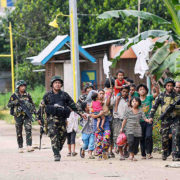WITH asylum seekers from remote Pacific islands attempting to reach Australia illegally by boat, the country has engaged in talks with the Philippines for their possible relocation, Australia’s immigration minister said Friday, Oct. 9.
Australian Foreign Minister Julie Bishop and Immigration Minister Peter Dutton declined to release details of the deal, but a report from The Australian stated it could cost more than 150 million Australian dollars ($108 million). Furthermore, multiple reports have stated there has been verbal confirmation between officials from both countries that the deal would move forward.
The Australian reported that Bishop met with Philippine Secretary of Foreign Affairs Albert del Rosario on the sidelines of the 70th session of the UN General Assembly in New York, and received verbal assurance that the refugee agreement would materialize.
Similarly, a report from The Daily Telegraph quoted Australian Immigration Minister Peter Dutton saying: “We have had bilateral discussions with other countries including the Philippines at an official level, at a ministerial level, over a number of months and the foreign minister obviously spoke with her counterpart in New York.”
According to Assistant Secretary Charles Jose, spokesperson for the DFA, a meeting between del Rosario and Bishop covered areas of the countries’ bilateral relations, with a focus on working toward a comprehensive partnership, Inquirer reported.
Asylum seekers have long been a controversial political issue in Australia, although the country has never experienced the influx of refugees currently entering Europe. Australia refuses to take in refugees who try to reach its shores by boat and instead pays Nauru and Papua New Guinea, which has a detention center on Manus Island, to hold them.
Australia currently has a $29 million deal with Cambodia, which it struck last year, to resettle refugees. However, with only four refugees having moved there, the agreement has been called a waste of money. The Cambodia plan has received further criticism from human rights groups that claim the country, given its history of poverty, corruption and human rights abuse, is not an optimal new home for refugees.
Similar concerns have been raised for the Philippines.
“It is just shameful that a developed nation like Australia would refuse these refugees and instead move to have them relocated to a struggling, developing country like the Philippines,” said Renato M. Reyes Jr., secretary general of Philippine advocacy group Bayan.
The Associated Press reported that Dutton addressed guarantees of safety Australia could offer refugees who settle in the Philippines, which is combating terrorism and violent kidnappings.
“We can provide the same guarantees that we can to Australians that travel to the Philippines each year, the expats that live in the Philippines and across southeast Asia or other parts of the world,” he said.
Bernard Kerblat, United Nations High Commissioner for Refugees representative to the Philippines, said Australia realized the poor conditions of asylum seekers in Manus Island and Nauru, after which it reached the deal with Cambodia last year.
“But there were questions raised about the appropriateness of the agreement,” Kerblat said, according to Inquirer, noting that Australia has been handing its commitment to the 1951 Refugee Convention to another state.
“Assuming that Australia is speaking with the Philippines on this, there is already a problem when Australia pushes the refugee back to the sea and park them in those two islands,” Kerblat added.
While Dutton did not reveal details on the number of refugees that could be resettled or a timeframe on the deal, he confirmed Friday that Australia is talking to multiple countries.
“We have been very open to discussions for a long period of time with those partners because we have been very clear about the fact that people on Nauru and people on Manus who have sought to come to our country illegally by boat won’t be settling in Australia,” Dutton told reporters. “We have a bilateral agreement with Cambodia. If we can strike other arrangements with other countries, we will do that.”
Dutton added that the country will continue to negotiate with the Philippines because there “is good faith on both sides.”
“If we can strike an agreement that is in the best interests of our country and from the Philippines’ perspective, their country, we will arrive at that point,” Dutton said.





